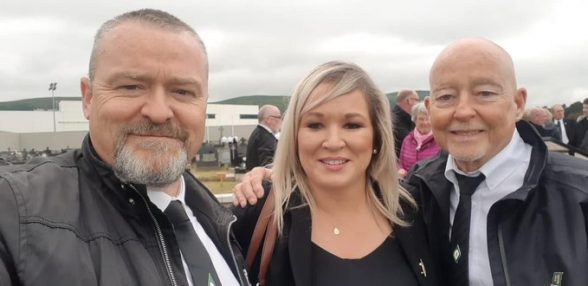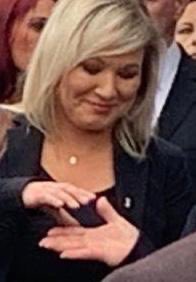
THE Public Prosecution Service (PPS) has not recommended prosecution for anyone concerned in relation to the funeral of Bobby Storey.
A police file has been with the Public Prosecution Service since December, 2020.
The actions of 24 people were examined, including those of Deputy First Minister Michelle O’Neill.
The funeral attracted 2,000 mourners at a time when only 30 people were permitted at public gatherings.
Mr Storey, 64, died in June following an illness.
He was a senior Provo figure and had formerly been the head of intelligence for the IRA in the 1990s.
The attendance of many senior Sinn Féin politicians at his funeral in west Belfast, at a time when strict limits on gatherings were in place, caused a political furore.
Director of Public Prosecutions Stephen Herron said he acknowledged the widespread public concern over the attendances at the funeral.
But he added the Health Protection (Coronavirus Restrictions) Regulations (Northern Ireland) 2020 had become “extremely difficult to navigate” because of various amendments, and were in some respects “inconsistent”.
“Furthermore, organisers of this particular funeral and police had engaged against the backdrop of evolving regulations in an attempt to ensure that a balance was struck in the funeral arrangements between respecting the sensitivity of the occasion and minimising any risk to both public health and safety,” he said.
“Prosecutions can only be brought where the available evidence provides a reasonable prospect of proving, beyond reasonable doubt, a breach of the criminal law.
“As a result of the factors considered we have concluded that the prosecution could not prove any breach of the regulations to the required standard.”
Mr Herron said the “lack of clarity and coherence within the regulations and the prior engagement between organisers and the police” would “pose an insurmountable difficulty” if prosecutions were brought.
“This is because they could all avail of a defence of reasonable excuse in terms of their actual or reasonably perceived compliance with a complex set of regulations and/or their reliance on the prior engagement with PSNI,” he added.
“The law as it applied to the Storey funeral was changed significantly on the evening before the funeral and further amended two days later.”
Mr Herron said the law relating to permissible conduct in the course of the pandemic was “not always clear cut and this can be challenging when it comes to enforcement of what are essentially health regulations in a criminal justice context”.
Deputy First Minister Michelle O’Neill said she wanted to once again apologise “for the hurt that has been caused to so many, including to Bobby Storey’s own family who have been thrust into the headlines at a time of immense grief”.
“Nine months ago I laid my dear friend Bobby Storey to rest. I accept and understand that many people, particularly those who had lost loved ones during the last year, felt that by my actions, I gave the impression that the rules did not apply to us all equally. Let me say clearly they do,” Ms O’Neill said.
“No funeral is more important than any other. No family or community is any more important than any other. All grief is devastating.”

PSNI Chief Constable Simon Byrne said enforcing the coronavirus regulations has been a “consistently challenging and often uncomfortable role for my officers”.
“The PPS decision points to the ambiguity and changing nature of the coronavirus regulations in force immediately before and on the day of the funeral which, in their view alone, amounted to an insurmountable hurdle to a successful prosecution,” he said.
“The decision not to prosecute does not change our view that what happened last summer when large numbers of people chose not to ‘stay at home’ at the height of a global pandemic was unnecessary, irresponsible and insensitive. It was wrong.”
The police investigation into suspected breaches of pandemic regulations began in July, with Mark Webster, the deputy chief constable of Cumbria Police, providing independent oversight.
It is understood all of those interviewed were Sinn Féin politicians.
Two people are facing prosecution in connection with attendance at the funeral of former Sinn Féin councillor Francie McNally in mid-Ulster in April 2020.



